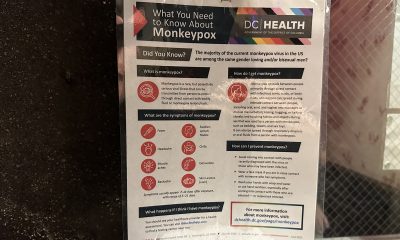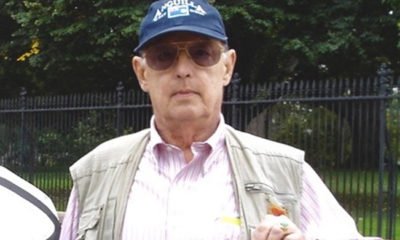Health
AIDS drugs cut off for Va. ADAP patients
Gay man dropped because T-cell count is ‘too high’

The Virginia Department of Health announced in December that 760 uninsured people with HIV who were being dropped from the state’s AIDS Drug Assistance Program due to a funding shortage could remain on the program until they found an alternative means of obtaining their medication.
But an undetermined number of Virginia ADAP clients who were dropped from the program during the past month have yet to be placed in an alternate program, and their supply of life-saving medications has run out, according to the directors of AIDS clinics in Fredericksburg and Fairfax County.
“Some of them are getting on other programs such as patient assistance programs from pharmaceutical companies and some of them are not,” said Zachary Hatcher, executive director of the Fredericksburg Area HIV/AIDS Support Services, a non-profit, community-based clinic similar to D.C.’s Whitman-Walker Clinic.
“And some of them are getting caught in this balance of not having enough medication to last them until they can get onto another program and they’re being taken off ADAP, which is very problematic,” he said.
Hatcher said Karen Berube, director of the INOVA Juniper Program, a non-profit clinic providing medical care to HIV patients in Fairfax County, told him she was seeing a similar development where dropped ADAP patients were running out of their AIDS drugs before being placed on an alternate program.
Berube couldn’t be immediately reached for comment. But sources familiar with the Metropolitan Washington Regional HIV Health Services Planning Council, which monitors ADAP issues in Virginia, D.C. and Maryland, among other areas, said they knew of dropped ADAP patients in Fairfax who had run out of drugs before being placed in another program.
Last week, Dr. Maureen Dempsey, the department’s deputy chief for public health, said the cutback in the ADAP program was designed to ensure that no one would be dropped and lose access to their drugs until they were placed in an alternate program.
This week, when the Blade made a follow-up inquiry after information surfaced that people were being dropped from the program without being placed in alternate programs, Dempsey said in a written statement that the department “will not transition a client without making every effort to contact them and provide assistance.”
She said in the statement that efforts to help clients “can be difficult” if the client initially provided inaccurate contact information. She said problems in transitioning to another program also arise if the client or their medical provider “encounter difficulties with signing and providing the necessary information within the timeline.”
Hatcher said clients sometimes encounter difficulties providing detailed financial information required by drug companies that offer drugs to former ADAP patients through Patient Assistance Programs or “PAP.” But he said clients in his and other clinics have case workers available to assist the patients and he did not believe this was the principal reason Virginia ADAP patients haven’t been able to find alternate programs.
A gay male resident of Fauquier County, Va., who is a client of the Fredericksburg Area HIV/AIDS Support Services clinic, said he’s been scrambling to find an alternate drug assistance program since December. At that time, a Virginia Department of Health employee informed him in a phone call that he had been dropped from ADAP, said the man, who spoke on condition that he not be identified.
“She wouldn’t give me her name or a way to contact her,” he said. “I kept calling and calling and calling,” he said, in a desperate attempt to find out why he was being dropped and who he could turn to continue to obtain the medication that has kept him healthy for nearly 10 years.
“The only thing they said early on was that they deemed that I was too healthy because my numbers are fairly strong,” the man said, referring to his T-cell counts, which measure the effectiveness of the body’s immune system.
When he finally received a letter from the state health department, it said the funding cuts had forced the department to decline his application to become a new ADAP client.
“I tried to tell them I was already in the program and that you dropped me,” he said. “So they’re telling the public that they won’t drop you until you’re placed in another program. That’s just a lie.”
Hatcher said the health department’s claim that it would smoothly transition everyone dropped from ADAP into another program is “an ideal concept to work toward” rather than a reality. The decision by the state to drop 760 people from the ADAP rolls created an enormous burden to transition so many people to other programs within just a few weeks time, he said.
“What we’re seeing is that there are people who are being removed before they have another option in place,” he said.
He said state health officials are now aware of this problem are working hard to correct it.
“They say I’m too healthy, but that won’t be for long,” the gay former ADAP patient said. And then I’ll get sick and will there be any help for me?”
He said the Fredericksburg clinic was working hard to find an alternate program for him. He was hopeful that a pharmaceutical industry program known as the Patient Assistance Program (PAP) would accept him and enable him to resume his medications that ran out about two weeks ago.
In December, the Virginia Department of Health announced that a severe funding shortage brought about by an unprecedented increase in enrollment in the program and shortage of state funds forced the state to cut the scope of the program.
ADAP is part of the federal Ryan White CARE Act program, in which the federal government and states share the costs of ADAP.
Virginia Gov. Bob McDonnell has proposed an increase in the state’s share of funding for ADAP for fiscal year 2012.
State health officials said that in addition to dropping as many as 760 ADAP clients, the state was closing its enrollment of new clients for the program except for pregnant women, children 18 years old or younger and people receiving treatment for an AIDS-related infection. Health department officials also said people with T-cell counts above a certain threshold level, at which they were not deemed to be at immediate risk for illness, would also be dropped from the program.
In her statement, Dempsey said the Virginia Department of Health has assembled “specialized teams” to help patients find alternate sources of obtaining their needed drugs. She said the department also created a toll-free helpline at 1-800-533-4148 to assist dropped ADAP patients.
Monkeypox
US contributes more than $90 million to fight mpox outbreak in Africa
WHO and Africa CDC has declared a public health emergency

The U.S. has contributed more than $90 million to the fight against the mpox outbreak in Africa.
The U.S. Agency for International Development on Tuesday in a press release announced “up to an additional” $35 million “in emergency health assistance to bolster response efforts for the clade I mpox outbreak in Central and Eastern Africa, pending congressional notification.” The press release notes the Biden-Harris administration previously pledged more than $55 million to fight the outbreak in Congo and other African countries.
“The additional assistance announced today will enable USAID to continue working closely with affected countries, as well as regional and global health partners, to expand support and reduce the impact of this outbreak as it continues to evolve,” it reads. “USAID support includes assistance with surveillance, diagnostics, risk communication and community engagement, infection prevention and control, case management, and vaccination planning and coordination.”
The World Health Organization and the Africa Centers for Disease Control and Prevention last week declared the outbreak a public health emergency.
The Washington Blade last week reported there are more than 17,000 suspected mpox cases across in Congo, Uganda, Kenya, Rwanda, and other African countries. The outbreak has claimed more than 500 lives, mostly in Congo.
Health
Mpox outbreak in Africa declared global health emergency
ONE: 10 million vaccine doses needed on the continent

Medical facilities that provide treatment to gay and bisexual men in some East African countries are already collaborating with them to prevent the spread of a new wave of mpox cases after the World Health Organization on Wednesday declared a global health emergency.
The collaboration, both in Uganda and Kenya, comes amid WHO’s latest report released on Aug. 12, which reveals that nine out of every 10 reported mpox cases are men with sex as the most common cause of infection.
The global mpox outbreak report — based on data that national authorities collected between January 2022 and June of this year — notes 87,189 of the 90,410 reported cases were men. Ninety-six percent of whom were infected through sex.
Sexual contact as the leading mode of transmission accounted for 19,102 of 22,802 cases, followed by non-sexual person-to-person contact. Genital rash was the most common symptom, followed by fever and systemic rash.
The WHO report states the pattern of mpox virus transmission has persisted over the last six months, with 97 percent of new cases reporting sexual contact through oral, vaginal, or anal sex with infected people.
“Sexual transmission has been recorded in the Democratic Republic of Congo among sex workers and men who have sex with men,” the report reads. “Among cases exposed through sexual contact in the Democratic Republic of the Congo, some individuals present only with genital lesions, rather than the more typical extensive rash associated with the virus.”
The growing mpox cases, which are now more than 2,800 reported cases in at least 13 African countries that include Kenya, Uganda, Rwanda, and prompted the Africa Centers for Disease Control and Prevention this week to declare the disease a public health emergency for resource mobilization on the continent to tackle it.
“Africa has long been on the frontlines in the fight against infectious diseases, often with limited resources,” said Africa CDC Director General Jean Kaseya. “The battle against Mpox demands a global response. We need your support, expertise, and solidarity. The world cannot afford to turn a blind eye to this crisis.”
The disease has so far claimed more than 500 lives, mostly in Congo, even as the Africa CDC notes suspected mpox cases across the continent have surged past 17,000, compared to 7,146 cases in 2022 and 14,957 cases last year.
“This is just the tip of the iceberg when we consider the many weaknesses in surveillance, laboratory testing, and contact tracing,” Kaseya said.
WHO, led by Director General Tedros Adhanom Ghebreyesus, also followed the Africa CDC’s move by declaring the mpox outbreak a public health emergency of international concern.
The latest WHO report reveals that men, including those who identify as gay and bisexual, constitute most mpox cases in Kenya and Uganda. The two countries have recorded their first cases, and has put queer rights organizations and health care centers that treat the LGBTQ community on high alert.
The Uganda Minority Shelters Consortium, for example, confirmed to the Washington Blade that the collaboration with health service providers to prevent the spread of mpox among gay and bisexual men is “nascent and uneven.”
“While some community-led health service providers such as Ark Wellness Clinic, Children of the Sun Clinic, Ice Breakers Uganda Clinic, and Happy Family Youth Clinic, have demonstrated commendable efforts, widespread collaboration on mpox prevention remains a significant gap,” UMSC Coordinator John Grace stated. “This is particularly evident when compared to the response to the previous Red Eyes outbreak within the LGBT community.”
Grace noted that as of Wednesday, there were no known queer-friendly health service providers to offer mpox vaccinations to men who have sex with men. He called for health care centers to provide inclusive services and a more coordinated approach.
Although Grace pointed out the fear of discrimination — and particularly Uganda’s Anti-Homosexuality Act — remains a big barrier to mpox prevention through testing, vaccination, and treatment among queer people, he confirmed no mpox cases have been reported among the LGBTQ community.
Uganda so far has reported two mpox cases — refugees who had travelled from Congo.
“We are for the most part encouraging safer sex practices even after potential future vaccinations are conducted as it can also be spread through bodily fluids like saliva and sweat,” Grace said.
Grace also noted that raising awareness about mpox among the queer community and seeking treatment when infected remains a challenge due to the historical and ongoing homophobic stigma and that more comprehensive and reliable advocacy is needed. He said Grindr and other digital platforms have been crucial in raising awareness.
The declarations of mpox as a global health emergency have already attracted demand for global leaders to support African countries to swiftly obtain the necessary vaccines and diagnostics.
“History shows we must act quickly and decisively when a public health emergency strikes. The current Mpox outbreak in Africa is one such emergency,” said ONE Global Health Senior Policy Director Jenny Ottenhoff.
ONE is a global, nonpartisan organization that advocates for the investments needed to create economic opportunities and healthier lives in Africa.
Ottenhoff warned failure to support the African countries with medical supplies needed to tackle mpox would leave the continent defenseless against the virus.
To ensure that African countries are adequately supported, ONE wants governments and pharmaceutical companies to urgently increase the provision of mpox vaccines so that the most affected African countries have affordable access to them. It also notes 10 million vaccine doses are currently needed to control the mpox outbreak in Africa, yet the continent has only 200,000 doses.
The Blade has reached out to Ishtar MSM, a community-based healthcare center in Nairobi, Kenya, that offers to service to gay and bisexual men, about their response to the mpox outbreak.
Health
White House urged to expand PrEP coverage for injectable form
HIV/AIDS service organizations made call on Wednesday

A coalition of 63 organizations dedicated to ending HIV called on the Biden-Harris administration on Wednesday to require insurers to cover long-acting pre-exposure prophylaxis (PrEP) without cost-sharing.
In a letter to Chiquita Brooks-LaSure, administrator of the Centers for Medicare and Medicaid Services, the groups emphasized the need for broad and equitable access to PrEP free of insurance barriers.
Long-acting PrEP is an injectable form of PrEP that’s effective over a long period of time. The FDA approved Apretude (cabotegravir extended-release injectable suspension) as the first and only long-acting injectable PrEP in late 2021. It’s intended for adults and adolescents weighing at least 77 lbs. who are at risk for HIV through sex.
The U.S. Preventive Services Task Force updated its recommendation for PrEP on Aug. 22, 2023, to include new medications such as the first long-acting PrEP drug. The coalition wants CMS to issue guidance requiring insurers to cover all forms of PrEP, including current and future FDA-approved drugs.
“Long-acting PrEP can be the answer to low PrEP uptake, particularly in communities not using PrEP today,” said Carl Schmid, executive director of the HIV+Hepatitis Policy Institute. “The Biden administration has an opportunity to ensure that people with private insurance can access PrEP now and into the future, free of any cost-sharing, with properly worded guidance to insurers.”
Currently, only 36 percent of those who could benefit from PrEP are using it. Significant disparities exist among racial and ethnic groups. Black people constitute 39 percent of new HIV diagnoses but only 14 percent of PrEP users, while Latinos represent 31 percent of new diagnoses but only 18 percent of PrEP users. In contrast, white people represent 24 percent of HIV diagnoses but 64 percent of PrEP users.
The groups also want CMS to prohibit insurers from employing prior authorization for PrEP, citing it as a significant barrier to access. Several states, including New York and California, already prohibit prior authorization for PrEP.
Modeling conducted for HIV+Hep, based on clinical trials of a once every 2-month injection, suggests that 87 percent more HIV cases would be averted compared to daily oral PrEP, with $4.25 billion in averted healthcare costs over 10 years.
Despite guidance issued to insurers in July 2021, PrEP users continue to report being charged cost-sharing for both the drug and ancillary services. A recent review of claims data found that 36 percent of PrEP users were charged for their drugs, and even 31 percent of those using generic PrEP faced cost-sharing.
The coalition’s letter follows a more detailed communication sent by HIV+Hepatitis Policy Institute to the Biden administration on July 2.
Signatories to the community letter include Advocates for Youth, AIDS United, Equality California, Fenway Health, Human Rights Campaign, and the National Coalition of STD Directors, among others.
-

 U.S. Federal Courts4 days ago
U.S. Federal Courts4 days agoFederal judge blocks Trump passport executive order
-

 Obituary5 days ago
Obituary5 days agoLocal attorney, LGBTQ rights advocate Dale Sanders dies at 75
-

 Books4 days ago
Books4 days ago‘Pronoun Trouble’ reminds us that punctuation matters
-

 Theater3 days ago
Theater3 days ago‘Bad Books’ a timely look at censorship in local library












